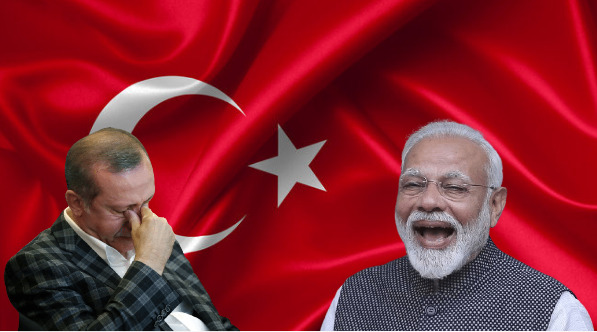Joining its fast friend Pakistan in solidarity, the Islamic state of Turkey on Thursday was placed on the “Grey List” over money laundering and terrorist financing by the Financial Action Task Force (FATF). Pakistan has been an illustrious member of the Grey List since 2018, and having Turkey on the list would make it feel a little less lonely. Turkey’s inclusion in the list has come as a major success for India and its allies that have been highlighting Turkey’s excesses.
Turkey: A synonym for Islamist terrorism
FATF president Marcus Pleyer in a virtual press conference from Paris, at the end of October plenary, announced the decision. It is pertinent to note that the plenary is the highest decision-making body of the watchdog which meets three times in a year to decide the status of countries and their place in different lists.
Pakistan warmly welcomes Turkey onto the FATF Grey List on terror financing. pic.twitter.com/FtvB7po0GJ
— Shiv Aroor (@ShivAroor) October 21, 2021
Erdoğan’s Turkey has fast become an ideologue of sorts for Islamist terrorist groups and countries like Pakistan across the globe. From Syria to France, and now even India to Armenia, Ankara has been shamelessly using proxy terrorists and Syrian mercenaries/fighters to disrupt global peace.
FATF had put Turkey on notice
The inclusion in the FATF Grey List was long coming as the financial watchdog had put Turkey on notice for two years when it found “serious shortcomings” in its approach towards combating money laundering and terrorist financing.
BIG BREAKING: Pakistan continues to remain on the Grey List of Financial Action Task Force (FATF). Turkey has been added to the Grey List of global watchdog FATF. Pakistan hasn’t taken all steps to ensure end to terror funding on its soil. Economic challenges will continue.
— Aditya Raj Kaul (@AdityaRajKaul) October 21, 2021
Turkey had been creating a robust international terror-financing network as an instrument of foreign policy. As such Ankara was blatantly violating the anti-terror financing benchmarks created by the FATF.
The FATF had then warned Turkey that it could be added to the international “grey list”, a move that can lead to some painful consequences for Turkey’s troubled economy.
Read More: Erdogan’s Turkey is flirting with Islamic terrorism and FATF should blacklist it
Grey List sanctions to hit Turkey’s dwindling economy hard
Ankara’s Forex reserves are dwindling, its currency hitting record lows against the US dollar, dipping tourist footfall, sanctions threat, and the COVID-19 Pandemic further destroying the Turkish economy. Erdoğan’s lacklustre fiscal policies are killing what was once a booming economy.
Erdoğan opposes any move to hike interest rates even as Turkey faces very high inflation rates and a constantly depreciating currency, Lira. It is well-settled amongst economists that interest rates must be raised to restrict inflation.
But Erdoğan believes that higher interest rates further push inflation. The Turkish President keeps cutting interest rates at regular intervals and cracks down on rational economists in his government who advocate increasing interest rates. The inclusion in the FATF grey list will further squeeze its economy and make the lives of ordinary citizens difficult.
Global investors are maintaining a safe distance from Turkey already. Total foreign investments in Turkish stocks and bonds stood at just $30.6 billion at the start of August. FDI too went down to $5.7 billion last year, as against the record $19 billion in 2017.
Turkey’s economic problem is further elevated by its being part of multiple military confrontations in the region. The country has been losing its financial capital to the Islamisation of the country with investors parting ways with Ankara.
Turning towards nationalism and trying to hide economic disaster in the camouflage of Islamisation and Jingoism can only go so far. Ankara is making enemies and losing allies, creating theatres of conflict, even where things could have been solved diplomatically.
Pakistan and its deep bond with the Grey List
As for Pakistan, in June 2018, a few months before Imran Khan came to power, FATF put the Islamic country on the grey list for being a centre of terror financing. Since then, Imran Khan made several efforts to instrument the exit of the country from the grey list as it would help to bring international investors and loans from multilateral institutions, but none of it worked so far.
The Pakistani Army has been funding Jihad from Afghanistan to the Kashmir Valley. The anti-Soviet jihad of the 1980s, as well as the terror activities in Kashmir, required an uninterrupted flow of capital. This was earned through drug trafficking. Pakistani military and the ISI have used Pakistan as a domestic market for the consumption of heroin. Due to this, hundreds of thousands fell prey to a drug culture that was encouraged by the Pakistani military establishment in the 1980s.
With Biden coming to the White House and China leading the Paris-based watchdog, Pakistan had harboured dreams that it will be taken out of the list. However, with Biden having not called Imran Khan, ever since his elevation to the White House and China forcing Pakistan to pay the default loans by taking additional loans from it – further plunging it into a debt crisis – Pakistan’s misery knows no bounds.
With its friend Turkey, who had promised to take it out of the FATF Grey List, joining the same party, it feels rather poetic that two exporters of Islamist terrorism have been humiliated together and will continue to face economic consequence for it.

























